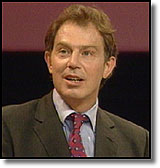
|
Sinn Fein Accepts Mitchell PrinciplesSinn Fein has made a formal pledge to peaceful politics and paramilitary disarming, in a move that allows them to join multi-party peace talks next week.Sinn Fein's leader, Gerry Adams, said it was a defining moment, and he wanted all sides to move forward into substantive negotiations based on peace and justice. However no Unionists attended the Stormont session where Sinn Fein made the pledge, and the main Protestant party in Northern Ireland, the Ulster Unionists, have yet to decide if they'll join the peace talks. The Sinn Fein delegation led by Gerry Adams and Martin McGuinness arrived at Stormont's castle buildings on Tuesday, confirming that they would formally commit themselves to the six Mitchell principles on democracy and non-violence, which include pledges of support for paramilitary disarmament and an end to punishment beatings.
Sinn Fein's director of publicity, Jim Gibney, told BBC Radio: "Sinn Fein doesn't have any difficulty in affirming the use of [the words] `exclusively peaceful means' because as a political party that is the only means that we have ever used. "Sinn Fein has never used violence of any description to further its political view point." Asked if Sinn Fein now believed that the gun had for ever been taken out of Irish politics, Mr Gibney said: "What you have to ensure is that a negotiated settlement addresses the source of conflict. When we get to that stage, I would say with confidence that there is no way back for people who are involved in armed activity. "We haven't got that negotiated settlement yet. We are in the process of searching for it. Once we have it, then I am confident we will begin to see the end of the gun in Irish politics."
Mr Mitchell said: "The challenge is now for the leadership to seize that opportunity. People in Northern Ireland have made their views clear. I believe those views will be heeded by the participants here and by others." He added: "We are in a situation which represents and opportunity at a critical juncture. We hope very much progress can be made. Both governments and the participants are trying very hard to achieve that progress." The Irish Foreign Minister, Ray Burke, described the events at Stormont as a "major step forward. We now have open before us the unprecedented prospect of genuinely inclusive negotiations, conducted in an atmosphere of peace. Indeed these negotiations have the capacity to be the most significant since those that led to the Anglo Irish Treaty in 1921. "I hope that the historic opportunity to play a part in the definition of a lasting accommodation will be seized by the representatives of the Unionist tradition," Mr Burke said.
Speaking at the TUC conference, the Prime Minister, Tony Blair, said the Government would hold Sinn Fein to their declaration with "total determination". "Let us hope that at long last the ancient enmities of hatred and sectarianism can be laid to rest and the people of Northern Ireland can have the future they want and deserve," he said. However, the Unionist parties are sceptical. They stayed away from Tuesday's proceedings, denouncing Sinn Fein's affirmation of the Mitchell principles as a charade. They believe the IRA will resume paramilitary activity if it's unhappy with the way peace talks develop. The Rev Ian Paisley's Democratic Unionists and Robert McCartney's UK Unionists have already withdrawn from the process. The Ulster Unionist leader, David Trimble, is under pressure from some of his MPs to stay away from the talks until the Government gives a guarantee that the IRA and other paramilitary groups will start handing over guns once the talks get under way. A statement by the Ulster Unionists said: "The subscription of Sinn Fein to the Mitchell Principles will completely lack credibility. Actions matter much more than words. Both the Northern Ireland Office and Sinn Fein must realise that actions are necessary in order to build confidence in their statements among the great number of the community." The whole process will be in danger of collapse if the Ulster Unionists decide against joining the talks. Their decision is expected to be announced after a meeting of the party's executive in Belfast on Saturday, on Saturday.
|
Diana, Princess of Wales, 1961-1997
Conference 97
Devolution
The Archive
News |
Issues |
Background |
Parties |
Analysis |
TV/Radio/Web
Interactive |
Forum |
Live |
About This Site
News |
Issues |
Background |
Parties |
Analysis |
TV/Radio/Web
Interactive |
Forum |
Live |
About This Site
© BBC 1997 |
politics97@bbc.co.uk |


